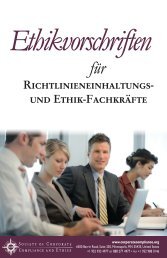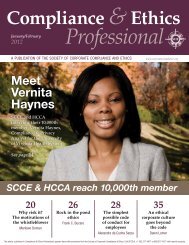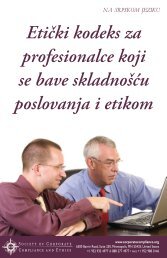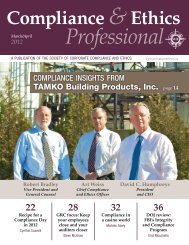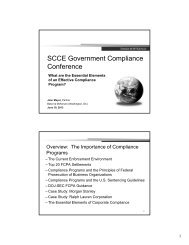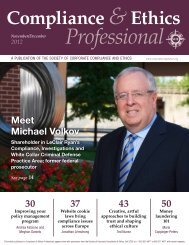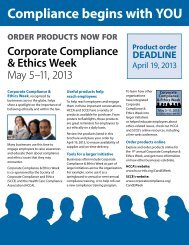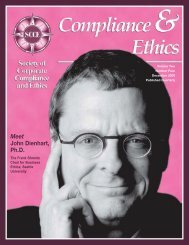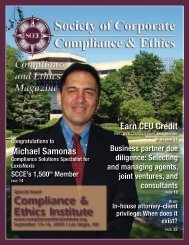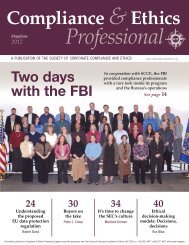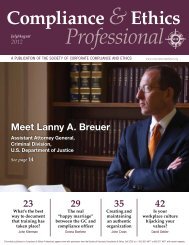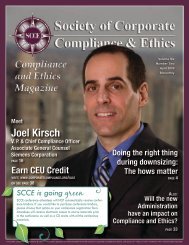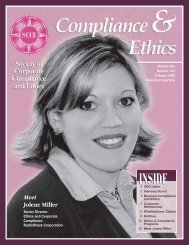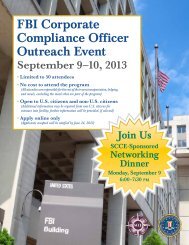Compliance &Ethics - Society of Corporate Compliance and Ethics
Compliance &Ethics - Society of Corporate Compliance and Ethics
Compliance &Ethics - Society of Corporate Compliance and Ethics
- No tags were found...
Create successful ePaper yourself
Turn your PDF publications into a flip-book with our unique Google optimized e-Paper software.
can be a very effective tool, by playing <strong>of</strong>f thatnatural discomfort. A questioner may use silenceby simply waiting at the end <strong>of</strong> your answer, asif surely you cannot be finished, surely there ismore. Don’t play that game. Answer the questionsimply, then stop <strong>and</strong> wait for the next question.Use the silence to prepare for what is ahead, notto volunteer more <strong>of</strong> what has passed.Exceptions to the ruleThere are two general exceptions to “do notvolunteer” that a witness <strong>and</strong> his/her lawyermight want to discuss. The first is the “simplemisunderst<strong>and</strong>ing” exception. If the questioner<strong>and</strong> you are not communicating <strong>and</strong> becomingbogged down because <strong>of</strong> a clear <strong>and</strong> simplemisunderst<strong>and</strong>ing over a basic fact, it may beworthwhile to volunteer to correct the error.The second exception is for “core themes.”Every matter has a few key themes that youas a witness may wish to get across. The moreinvolved a witness is with the matter, particularlyas a party, the more important thesethemes become. If witness <strong>and</strong> lawyer agreeon these themes, the two <strong>of</strong> you may also wantto think about whether <strong>and</strong> when you want togo beyond the simple answer to a question <strong>and</strong>volunteer information to support it.Testimony is serious business. Everyone inthe room has a job to do. Many <strong>of</strong> these rulesare aimed at disciplining the questioner to dohis job right—to make him/her ask clear <strong>and</strong>fair questions. “Don’t volunteer” is aimed atdisciplining witnesses to do their job right—answer the question, then stop. ✵Dan Small (dan.small @ hklaw.com) is a Partner with Holl<strong>and</strong> & Knightin Boston <strong>and</strong> Miami. His practice focuses on complex civil litigation,government investigations, <strong>and</strong> witness preparation. He is the author <strong>of</strong> theABA’s manual, Preparing Witnesses (Third Edition, 2009). Robert F. Roach(robert.roach @ nyu.edu) is Chief <strong>Compliance</strong> Officer <strong>of</strong> New York University inNew York City <strong>and</strong> Chair <strong>of</strong> the ACC <strong>Corporate</strong> <strong>Compliance</strong> <strong>and</strong> <strong>Ethics</strong> Committee.Your Guide to Becomingan Effective InvestigatorThe First Information Is Almost Always Wrong:150 Things to Know AboutWorkplace InvestigationsBy Meric Craig Bloch, Esq., CCEP, PCI, CFE<strong>Compliance</strong> & <strong>Ethics</strong> Pr<strong>of</strong>essional May/June 2013Effective workplace investigationsare equal parts art <strong>and</strong> science.Meric Bloch has mastered bothaspects through years <strong>of</strong> hard-earnedexperience. In this book, he detailsthe strategies <strong>and</strong> tactics he knowswork best.Bloch_WorkplaceInvestigations_halfpage_CEPad_4c.indd 154 www.corporatecompliance.org +1 952 933 4977 or 888 277 4977• Protect Your CareerHow to Think Like a Workplace Investigator• Protect Your CompanyHow to Integrate Your Investigationsinto Your Company’s Operations• Protect Your CaseHow to Conduct an EffectiveWorkplace InvestigationORDER ONLINE ATwww.corporatecompliance.org/FirstInformation3/22/13 3:32 PM



